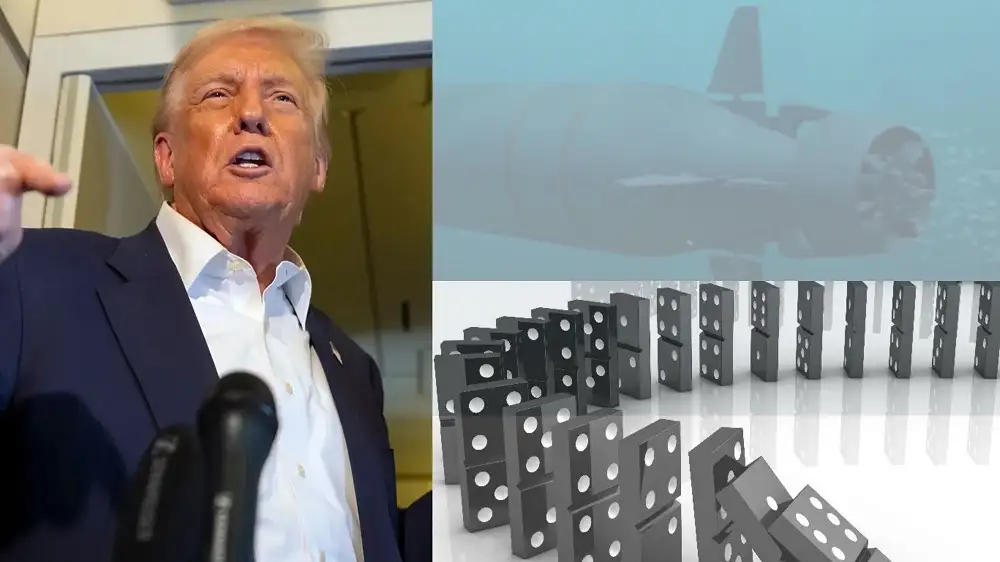US President Donald Trump has caused a new stir in the corridors of international politics with a sudden announcement.
In a post on the Truth Social platform, he announced that he had instructed the US Department of War to begin testing nuclear weapons on an equal footing with countries that also have nuclear programs. Whether Trump is referring to field tests of atomic weapons or possible simulations of tests of missiles with the potential to carry nuclear warheads is unclear. The problem is that both the US and other nuclear powers conduct such tests regularly, and it is difficult to imagine that Trump could have meant this.
Trump announced this in fact a few days after Russian President Vladimir Putin, in military uniform and in a festive mood, reported on the successful test of the Burevestnik intercontinental ballistic missile with the potential to carry nuclear warheads, as a cutting-edge weapon that has no equal in the world. According to the declared parameters of this missile, it is capable of traveling at least 14 thousand kilometers and, in fact, can target any point in the world.
Putin's statement was followed by the statement of the Deputy Chairman of the Russian Security Council, former President of the country Dmitry Medvedev, that Russia had successfully tested another innovative weapon, the Poseidon underwater remote-controlled device, noting that its new test would lead to the disappearance of Belgium. The latter's designation as a target was a response to the earlier statement by Belgian Defense Minister Theo Franken that NATO would raze Moscow to the ground if Russia launched a missile attack on Brussels.
By the way, this is not Medvedev's first nuclear threat; Back in the summer, he threatened the United States with nuclear war, to which Donald Trump himself responded by warning Medvedev to heed his words and warning that he had sent two nuclear submarines to the Russian coast as a defensive measure.
It is evident that Washington is irritated by Moscow's "muscle show." But at the same time, Trump announced ordering nuclear weapons tests just before he met with Chinese President Xi Jinping in Busan last Thursday, and without any prior notice, which indicates that Trump is consciously trying to make this topic part of the agenda of US-Chinese negotiations.
With the new US security concept, Washington considers its main challenge not to be Russia but China. According to expert conclusions, China's nuclear potential will be equal to that of America and Russia within five years. Trump's statement is therefore not only a clear anti-Russian but also an anti-Chinese message, the purpose of which is, more likely, to restrain its two main adversaries, to keep them within the "rules of the game" of restrictions on nuclear weapons testing.
However, this is a typical case when the coin also has a second side. The resumption of nuclear testing (if that is what Trump meant) could de facto completely collapse the "taboo of silence" based on the 1996 Comprehensive Nuclear-Test-Ban Treaty. This will have a domino effect: Russia, China, India, Pakistan, and, of course, Israel, could resume their tests, modernizing their arsenals. Moscow, by the way, has already warned of such consequences. Kremlin spokesman Dmitry Peskov stated that if anyone refuses to freeze nuclear weapons testing, Russia will act accordingly. He noted that if Trump means the appearance of the "Burevestnik", then it is not a nuclear weapon.
Even those countries that, despite being close to having nuclear weapons in financial and technological terms, continue to link their security with maintaining international law and the balance of power, will begin to take measures to acquire nuclear weapons. Moreover, after the US opens Pandora's box, there will be no moral or political lever left to restrain these countries from such an idea.
These developments may become the beginning of a new "cold war", moreover, without deterrent mechanisms. NATO, Russia, and China will enter a phase of an arms race, which, in addition to being a purely security issue, will burden economies and finally bury the legal and political institutions of international control. Nuclear weapons will become an instrument not of deterrence, but of political pressure, as it was when they were first used.
As a result, with this statement, Trump is more likely to confront humanity with a new global challenge than to force Moscow and Beijing to adhere to the logic and framework of the Comprehensive Nuclear-Test-Ban Treaty, signed in 1996. One can only hope that Trump is simply using the method of soft power.
Gor Abrahamyan


















